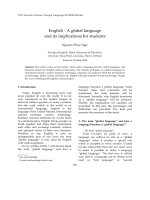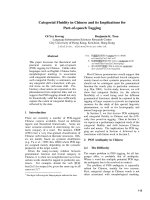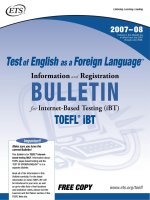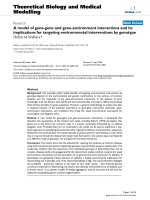Euro English A Debate and its Implications for Teaching English as a Foreign Language
Bạn đang xem bản rút gọn của tài liệu. Xem và tải ngay bản đầy đủ của tài liệu tại đây (132.9 KB, 6 trang )
Euro-English:
A Debate and its Implications for Teaching English as a Foreign Language
by
Christine Raack
A Thesis Presented in Partial Fulfillment
of the Requirements for the Degree
Master of Arts
Approved March 2012 by the
Graduate Supervisory Committee:
Elly Van Gelderen, Chair
Karen Adams
Carla Ghanem
ARIZONA STATE UNIVERSITY
May 2012
UMI Number: 1508467
All rights reserved
INFORMATION TO ALL USERS
The quality of this reproduction is dependent on the quality of the copy submitted.
In the unlikely event that the author did not send a complete manuscript
and there are missing pages, these will be noted. Also, if material had to be removed,
a note will indicate the deletion.
UMI 1508467
Copyright 2012 by ProQuest LLC.
All rights reserved. This edition of the work is protected against
unauthorized copying under Title 17, United States Code.
ProQuest LLC.
789 East Eisenhower Parkway
P.O. Box 1346
Ann Arbor, MI 48106 - 1346
ABSTRACT
This thesis investigates the acceptability of a new variety of English
among the English teaching community in Germany. A number of linguists claim
there is a new variety of English developing in continental Europe, also known as
Euro-English. Their research has surfaced multiple features that are unique to
European speakers of English. Twenty-one teachers participated in a survey. They
answered a questionnaire consisting of two parts. Part one investigates the
background of the teachers, their attitudes towards different varieties of English,
and their awareness of the research regarding Euro-English. Part two tests the
acceptability of ten features that have been claimed to be specific for mainland
Europeans. Results of this study reveal that there is little awareness of non-native
varieties and many find it hard to accept the features of Euro-English. However,
the teachers show a genuine interest in this topic. Where there is a general
preference in holding on to the guidelines of standard norms, many comments
indicate that teachers think about issues of identity and how their teaching could
be affected by a broader scope that exceeds traditional methods.
i
TABLE OF CONTENTS
CHAPTER
Page
1 INTRODUCTION ................................................................................ 1
2 ENGLISH AS A LINGUA FRANCA (ELF)......................................... 6
English Worldwide........................................................................... 6
Defining English as a Lingua Franca (ELF)...................................... 8
Conceptualizing English as a Lingua Franca (ELF) ........................ 10
ELF Features.................................................................................. 11
Phonology...................................................................................... 12
Pragmatics ..................................................................................... 13
Lexicogrammar.............................................................................. 20
3 ENGLISH IN EUROPE ...................................................................... 24
The Role of English in Europe ....................................................... 24
The Role of English on a National Level ........................................ 27
The Example of Sweden................................................................. 27
The Example of Germany .............................................................. 28
Resistance to English ..................................................................... 32
English as the EU Working Language ............................................ 34
The European Identity.................................................................... 36
ii
CHAPTER
Page
4 EURO-ENGLISH ............................................................................... 41
The Term Euro-English.................................................................. 41
The Vienna-Oxford International Corpus of English (VOICE) ....... 44
Features of European Languages.................................................... 45
Features of Euro-English................................................................ 52
A New Variety or Learner Language.............................................. 58
Native and Non-native Teachers of English.................................... 62
Teaching the Variety ...................................................................... 64
5 THE STUDY ...................................................................................... 68
Survey of English Teachers............................................................ 70
Participants .................................................................................... 71
The Questionnaire .......................................................................... 73
Results ........................................................................................... 74
Professional Opportunities for Non-native and Native Speakers ..... 74
Identity........................................................................................... 77
Awareness of other Varieties of English......................................... 78
Awareness of Euro-English as a Topic of Discussion ..................... 80
Student Age Groups and Motivational Levels................................. 83
iii
CHAPTER
page
Varieties of English: Availability and Preference ........................... 83
Acceptability of Euro-English Features .......................................... 89
Discussion of Results and Comments ............................................. 98
6 CONCLUSION................................................................................. 108
REFERENCES................................................................................................ 114
APPENDIX
A INFORMATION LETTER ABOUT THE STUDY.......................... 123
B QUESTIONNAIRE.......................................................................... 125
C APPROVAL FOR EXEMPT RESEARCH....................................... 131
iv









